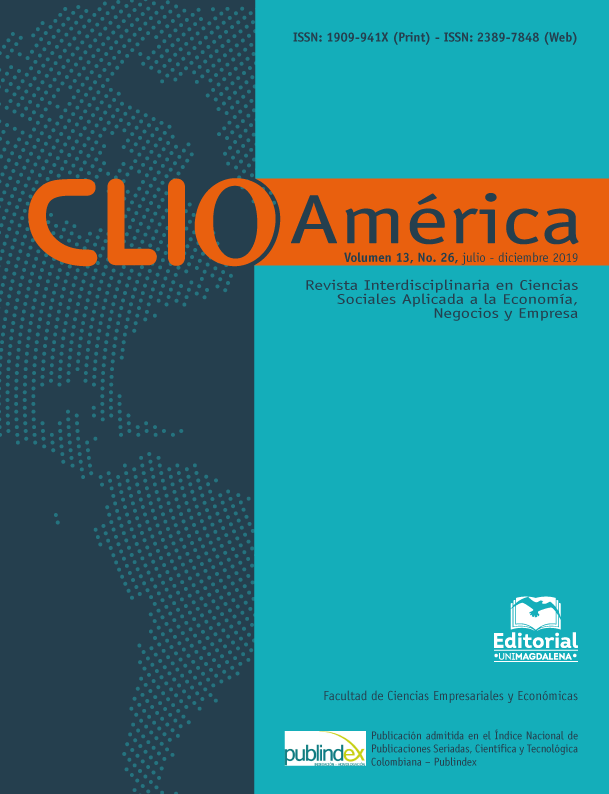Success factors of MSMEs in Colombia
Contenido principal del artículo
Resumen
Descargas
Detalles del artículo

Esta obra está bajo una licencia internacional Creative Commons Atribución-NoComercial-CompartirIgual 4.0.
Esta revista proporciona un acceso abierto a su contenido, basado en el principio de ofrecer al público un acceso libre a las investigaciones ayuda a un mayor intercambio global del conocimiento. De igual forma su versión impresa es de libre acceso y no tiene costos asociados por publicación.
Citas
Aparicio, S., Urbano, D., & Audretsch, D. (2016). Institutional factors, opportunity entrepreneurship and economic growth: Panel data evidence. Technological Forecasting and Social Change, 102, 45–61. https://doi.org/10.1016/j.techfore.2015.04.006
Audretsch, D. & Keilbach, M. (2004). Entrepreneurship Capital and Economic Performance. Regional Studies, 38(8), 949–959. https://doi.org/10.1080/0034340042000280956
Benzing, C., Chu, H., & Bove, R. (2005). Hungarian and Romanian Entrepreneurs in Romania - Motivation, Problems, and Differences. Journal of Global Business, 16, 77–87. https://www.researchgate.net/publication/308348570_The_motivation_problems_and_perceived_success_of_entrepreneurs_in_Romania
Benzing, C., Chu, H., & Kara, O. (2009). Entrepreneurs in Turkey: A Factor Analysis of Motivations, Success Factors, and Problems. Journal of Small Business Management, 47(1), 58–91. https://doi.org/10.1111/j.1540-627X.2008.00262.x
Castaño, M. S., Méndez, M. T., & Galindo, M. A. (2015). The effect of social, cultural, and economic factors on entrepreneurship. Journal of Business Research, 68(7), 1496–1500. https://doi.org/10.1016/j.jbusres.2015.01.040
Chu, H. & Katsioloudes, M. (2002). Cultural Context in the Vietnamese-American Entrepreneurial Experience. Journal of Transnational Management Development, 7(2), 37–46. https://doi.org/10.1300/J130v07n02_04
Chu, H., Benzing, C., & McGee, C. (2007). Ghanaian and Kenyan Entrepreneurs: Comparative Analysis of Their Motivations, Success Characteristics and Problems. Journal of Developmental Entrepreneurship, 12(3), 295–322. https://doi.org/10.1142/S1084946707000691
García, R. C., Martínez, C. A., & Fernández, G. R. (2010). Características del emprendedor influyentes en el proceso de creación empresarial y en el éxito esperado. Revista Europea De Dirección y Economía De La Empresa, 19(2), 31–47. https://dialnet.unirioja.es/descarga/articulo/3185118.pdf
Global Entrepreneurship Monitor - GEM. (2016). Reporte GEM Colombia 2015 - 2016. Global Entrepreneurship Monitor (GEM). http://gemcolombia.org/wp-content/uploads/GEM-Colombia-20165.compressed3.pdf
Gobernación de Boyacá - Colombia. (2018). Boyacá en cifras 2016 - 2017. Camara de comercio de Tunja. https://cctunja.org.co/boyaca-en-cifras/
Hernández, S., Fernández, C., & Baptista, P. (2010). Metodología de la Investigación (5th ed). McGraw-Hill. http://www.academia.edu/download/38911499/Sampieri.pdf
Koe, W. L., Omar, R., & Rizal, S. J. (2015). Factors Influencing Propensity to Sustainable Entrepreneurship of SMEs in Malaysia. Procedia - Social and Behavioral Sciences. 172, 570–577. https://doi.org/10.1016/j.sbspro.2015.01.404
Lim, D. S., Oh, Ch., & De Clercq, D. (2016). Engagement in entrepreneurship in emerging economies: Interactive effects of individual-level factors and institutional conditions. International Business Review, 2(4), 933-945. https://doi.org/10.1016/j.ibusrev.2015.12.001
Mine, C. E., Hienkel, T., & Horwitz, W. (2019). Comparative entrepreneurship factors between North Mediterranean and North African Countries: A regression tree analysis. The Quarterly Review of Economics and Finance, 73, 88–94. https://doi.org/10.1016/j.qref.2018.07.009
Nakamura, H. (2019). Relationship among land price, entrepreneurship, the environment, economics, and social factors in the value assessment of Japanese cities. Journal of Cleaner Production, 217, 144–152. https://doi.org/10.1016/j.jclepro.2019.01.201
Ouellet, A. & Rodriguez, H. (2001). Procesos de investigación: Introducción a la metodología de la investigación y las competencias pedagógicas (1st ed.). Escuela de Administración de Negocios – EAN. Centro de investigaciones. https://www.worldcat.org/title/procesos-de-investigacion-introduccion-a-la-metodologia-de-la-investigacion-y-las-competencias-pedagogicas/oclc/991748539
Regele, M. & Neck, H. (2012). The entrepreneurship education subecosystem in the United States: Opportunities to increase entrepreneurial activity. Journal of Business and Entrepreneurship, 23(2), 25–47. https://www.econbiz.de/Record/the-entrepreneurship-education-sub-ecosystem-in-the-united-states-opportunities-to-increase-entrepreneurial-activity-regele-matthew/10009548102
Schaper, M. T. (2006). Distribution Patterns of Small Firms in Developed Economies: Is There an Emergent Global Pattern? International Journal of Entrepreneurship and Small Business, 3(2), 183–189. https://econpapers.repec.org/RePEc:ids:ijesbu:v:3:y:2006:i:2:p:183-189
Spiegel, M. & Stephens, L. (2018). Schaum’s Outline of Statistics (6th ed.). Mc Graw-Hill Education. https://www.amazon.com/Schaums-Outline-Statistics-Sixth-Outlines/dp/1260011461
Tunali, C.B. & Sener, S. (2019). The Determinants of Entrepreneurship in Turkey. Procedia Computer Science, 158(2019), 648–652. https://doi.org/10.1016/j.procs.2019.09.099

